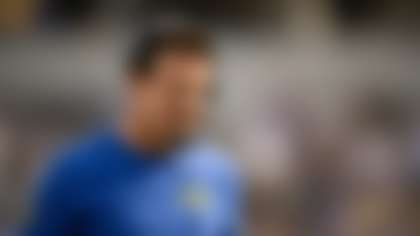A large part of being successful in the NFL is having the ability to forget.
Forget the good plays. Forget the bad plays. Forget the past and focus on the present -- on the next play, the next drive, the next opponent.
That's the challenge Norv Turner and the San Diego Chargers face this week.
The only way for the Chargers to deal with the officiating blunder that cost them a victory against the Denver Broncos -- a fumble that was incorrectly ruled an incompletion but not reversed because the whistle had blown the play dead (the explanation is as silly to type as it was to hear) -- is to forget about it.
But that's so much easier said than done.
For one thing, it doesn't fit well into the "forgettable" category. A win taken away by something out of a team's control has a way of sticking with coaches and players for a long, long time. Human nature dictates as much. As long as the Chargers look at the final score -- Denver 39, San Diego 38 -- they will always see injustice.
Adding to the difficulty of putting the whole thing behind them is the fact they have an extra day to stew about it. Their next game, against the New York Jets, is not until Monday night, Sept. 22. The frustration and pain will continue to linger … and linger … and linger.
It didn't help that, according to Turner, referee Ed Hochuli told the coach, "I blew it!" And it doesn't help that an NFL spokesman has said the league's competition committee would look into the rule that, despite the fact the ball clearly fell from the grasp of quarterback Jay Cutler and was clearly recovered by linebacker Tim Dobbins, forced the officials to allow the Broncos to retain possession in the final seconds. (I'll go out on a limb and predict that the rule will be altered in some fashion so that a $6.50 whistle won't undermine the league's multi-million-dollar investment in technology designed to improve the chances of getting the call right.)
Fixing the problem at the league meetings in March does nothing to help the 0-2 Chargers in September. It won't help at the end of the season, either, when the loss to the Broncos possibly prevents them from winning the AFC West or making the playoffs in what quickly is shaping up as an extremely wide-open conference.
Coaches recognize the price of defeat better than anyone. At the end of the season, a loss will simply be a loss; it won't carry an asterisk that says "officiating error." And, where job security is concerned, its ramifications will be the same as any other loss.
I've had more than one head coach tell me through the years that apologies from officials or the league office after their team has suffered because of a blown call are meaningless. If anything, they only create greater anger, frustration, and helplessness.
Turner called the blunder "unacceptable," but he is going to have to get over it. He is going to have to do everything possible to convince his players that he really meant what he said when he told reporters Monday, "You've got to move on … it's gone."
How does Turner achieve that?
A good place to start would be to talk about the fact the Chargers' defense, supposed to be a strong point even without Shawne Merriman, gave Brandon Marshall enough room to catch 18 passes and Cutler too much time. He should also address the fact the Chargers allowed a two-point conversion that never should have been scored after the fumble that wasn't a fumble.
Still another would be the expectation that Brett Favre, who has had his share of spectacular performances on Monday Night Football, will be looking for redemption while trying to make the most out of a much-hyped prime-time appearance in his new uniform.
Cowboys still the one
Carucci's rankings
After holding on to defeat the Philadelphia Eagles 41-37 on a memorable Monday night in Texas Stadium, the Dallas Cowboys remain in the No. 1 spot in this week's rankings. **More ...**
If the Cowboys truly posses what it takes to represent the NFC in the Super Bowl, as many of us believe they do, they had to beat the Eagles at home. They had to beat the same divisional opponent that defeated them at home each of the previous two seasons. It didn't matter how the Cowboys did it, but the fact they were able to come out on top in the wildest of shootouts only further solidifies their elite status.
The Cowboys are loaded with enough offensive playmakers to withstand the most explosive attack the opposition can muster. They did just that against an Eagles offense that demonstrated it could be every bit as prolific against a powerhouse as it could against a bottom-dweller, such as St. Louis in Week 1.
When one considers the Cowboys' multiple game-changing players -- Tony Romo, Terrell Owens, Jason Witten, Marion Barber, and rookie Felix Jones -- it's hard to imagine them not going the distance. The Giants certainly could have something to say about it. We also haven't heard the last from the Eagles, or for that matter, the Redskins. But I think the Cowboys proved in the final Monday night game in Texas Stadium that they're a cut above the rest of the division. I know Romo made a couple of bad mistakes, including a fumble that resulted in a Philadelphia touchdown. Yet the fact he was able to pull himself together and win the shootout against Donovan McNabb spoke volumes about his resilience and continued growth and development.
More Monday night musings
» I thought they prided themselves on playing good defense in Dallas and Philadelphia. That pride quickly turned to shame in this NFL version of Arena League football. As stacked as both teams are on offense, they shouldn't have been able to move the ball as easily as they did against each other. I was troubled by the pass coverage and poor tackling on both sides, but I had bigger issues with the Cowboys' inability to contain a Philadelphia offense missing its top two receivers. And what was it with all of the facemask penalties on Dallas defenders? The game did nothing for the reputations of two of the league's renowned defensive masterminds, Cowboys coach Wade Phillips and Eagles defensive coordinator Jim Johnson. But it did plenty for the resumes of Philadelphia offensive coordinator Marty Mornhinweg and his Dallas counterpart, Jason Garrett.
» The Eagles go nowhere without McNabb performing as well as he has the past two weeks. Yet, there is no discounting how vital Brian Westbrook is to McNabb's success. With Westbrook lining up in a variety of positions as both a runner and receiver, a defense can never be quite certain of what to expect. Consequently, it must try and account for everything. In the process, as we often saw from the Cowboys, its integrity is compromised against the run and the pass. Westbrook is able to exploit the weaknesses that form in both areas.
» DeSean Jackson doesn't get a free pass just because of Westbrook's leap into the end zone one play after the Eagles' rookie receiver foolishly dropped the ball short of the goal-line during a premature touchdown celebration. Jackson is fortunate, through the same whistle-stops-the-play-mechanism that impacted the Denver-San Diego game, that the Eagles wound up with a first down at the Cowboys 1-yard line and not a turnover. He's fortunate to have Westbrook as a teammate and an example (you see, players are rewarded for the sort of team-first attitude that Westbrook displayed a year ago in Texas Stadium when he intentionally stopped short of the goal line to help kill time and preserve an Eagles victory). Jackson has got a lot of growing up to do. His over-the-top cockiness was mostly tolerated through the preseason, and he helped himself by backing it up with a big game in the season opener. Jackson's talent is considerable, but his immaturity is a potential problem that Andy Reid should address with a stern lecture, if not a fine.
0-2 worry lines
Every 0-2 team should be worried, but some more than others. Here are the 0-2 teams that could have a particularly hard time bouncing back:
» Cincinnati Bengals, because they can't score.
» Cleveland Browns, because they can't score.
» Detroit Lions, because they can't stop anybody.
» Kansas City Chiefs, because they can't score.
» Miami Dolphins, because they can't score.
» Minnesota Vikings, because they can't score.
» St. Louis Rams, because they can't stop anybody and they can't score.
» Seattle Seahawks, because they can't stop anybody.
And then, here are the 0-2 teams that have a reasonable chance to rebound:
» Jacksonville Jaguars, because they can stop somebody.
» San Diego Chargers, because they can score.
Opportunity should have knocked
Why, when the Bears faced a fourth-and-1 from the 50-yard line with 2:00 left and the game against the Panthers on the line, did they ask fullback Jason McKie to try and pick up the first down rather than rookie sensation Matt Forte, who already had a game-high 92 rushing yards? Panthers tackle Maake Kemoeatu collapsed the middle of the line, and McKie was stopped cold. Perhaps the result would have been the same with Forte, but he does have more explosiveness to the outside. Afterward, Forte couldn't hide his desire to have had the opportunity to show what he could have done under those circumstances.
"You know I want the ball in tight situations, when it's fourth-and-1 or when it's first-and-10," he said. "I want the ball all the time so I can make a play."
Love and marriage
There might not be a more perfect marriage between supporting cast, scheme, and quarterback than there is in Arizona. Ken Whisenhunt's offense calls for his two highly-talented receivers, Anquan Boldin and Larry Fitzgerald, to often work underneath coverage and utilize their considerable run-after-catch ability. That couldn't be more ideal for the man throwing the ball, Kurt Warner, because he thrived in such an offense while establishing himself as the NFL's Most Valuable Player in St. Louis. Warner's tremendous accuracy and knack for quickly reading coverages and getting rid of the ball allow him to consistently hit his receivers in stride, which lets them turn on the jets for big gains. It's the same sort of thing he had going with Torry Holt and Isaac Bruce during the Rams' Super Bowl run.
Although Warner has maintained his customary politeness, he is playing with a fairly sizable chip on his shoulder. He wants to prove, beyond a shadow of a doubt, he is not too old to be a top-level starter. That's why he was particularly proud of the fact that, in Week 2 against Miami, he posted a perfect 158.3 passer rating for the third time in his career (while throwing for 361 yards and three scores to Boldin), giving him a piece of an NFL record along with Peyton Manning.
Action Jackson
The Bills unleashed a secret weapon that the Jaguars weren't prepared to handle in Buffalo's victory at Jacksonville. His name is Fred Jackson, an explosive reserve running back who caught a game-high seven passes for 83 yards. He turned one short catch into a 33-yard gain and another into a 26-yard pickup. Amazingly, the Bills' starting running back, Marshawn Lynch, is a dangerous receiver in his own right.
Sad sacks
Here are two extreme examples of how meaningful and meaningless sacks can be. The New York Giants dumped Marc Bulger six times on the way to a 41-13 pounding of the Rams. The Seahawks put J.T. O'Sullivan on the ground eight times, yet he still threw for 321 yards (22 shy of his career total before the game) in Seattle's 33-30 overtime loss against the 49ers.
Punchy Panthers
Carolina's victory over Chicago was a big step but not merely because it snapped a four-game losing streak in openers at Bank of America Stadium or put the Panthers above .500 (25-24) at home in the John Fox era. It was another sign of progress for a franchise that has been trying to fight its way back into being a contender.
"We really think we've got a different team this year," offensive tackle Jordan Gross said. "We've had two close games, two nail-biters. We were able to win them both. (Beating the Bears) just adds on to the belief that we've got what it takes to win a few games."
Reading material
A recommendation for your football bookshelf: "The Birth of the New NFL: How the 1966 NFL/AFL Merger Transformed Pro Football," by Larry Felser. This is must reading for any NFL fan, regardless of age. In fact, I think younger fans should make every effort to pick up a copy because its historic perspective provides a better understanding of why and how the league got to where it is. It's loaded with wonderful anecdotes told by one of the game's all-time great storytellers. Felser, who wrote about the Bills from their inception in 1959 for the Buffalo Courier-Express and later for the Buffalo News, is member of the writers' wing of the Pro Football Hall of Fame.
Here's an interesting tidbit about the author: When he was president of the Professional Football Writers of America in the early 1970s, he was a driving force behind three major changes in how the media covers the NFL: Installation of televisions in strategic places in all league press boxes so that writers could see the same replays and close-ups that many of their readers saw at home, smoothing the way for female reporters to have access to the locker room and other areas where their male counterparts could go to do their job, and developing a closer working relationship with the NFL Players Association so that its side would be represented more fairly in stories about labor disputes with team owners.
Have a question for Vic? Send it to AskVic@nfl.com, and the best ones will be answered on NFL.com.



